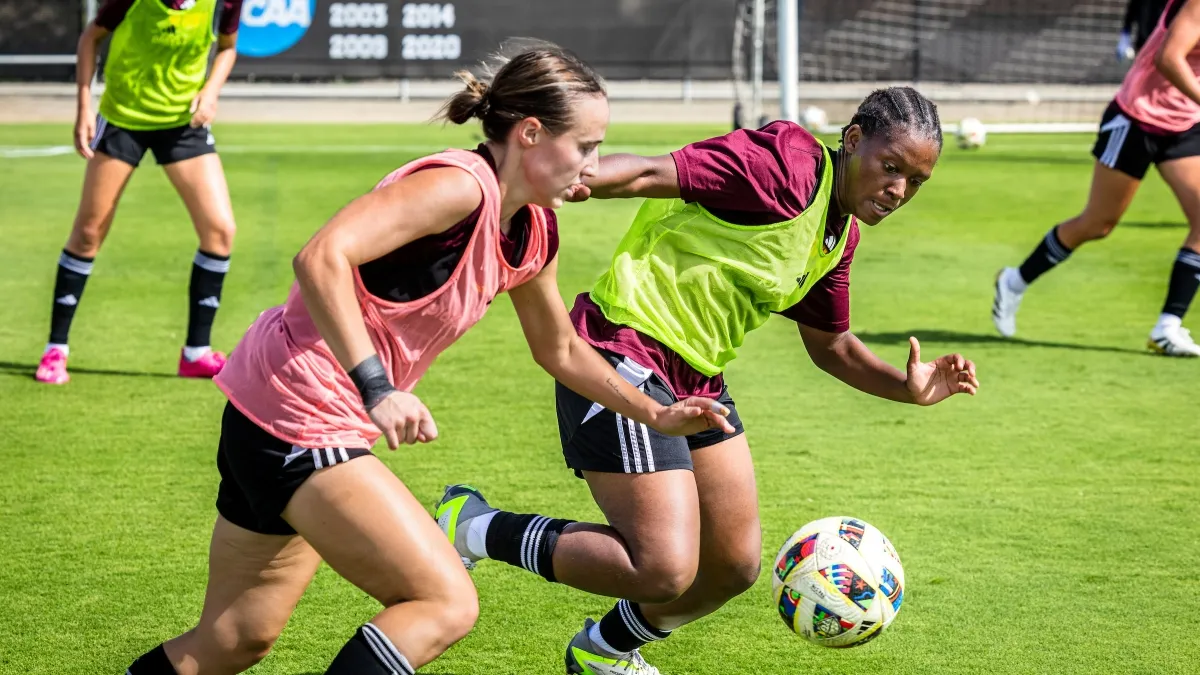A global tapestry: More than 100 international student-athletes call ASU home
ASU women's soccer team alone includes 17 players from 7 countries

Midfielder Gositang Motshegwe (right) goes for control of the ball during ASU women’s soccer practice on Tuesday, Sept. 2. Motshegwe is a first-year business student from South Africa. Seventeen of the team’s 26 players are international student-athletes from seven different countries. Photo by Charlie Leight/ASU News
When Arizona State University women’s soccer player Grace Gillard first met South African teammate and freshman midfielder Gositang Motshegwe, there was something she had to ask.
Was it true, Gillard wondered, that lions and giraffes roam free back in South Africa?
“Yes,” Motshegwe replied. “We’ll be playing a soccer game; then in a field over there will be a giraffe or a lion or something like that.”
“I thought that was fascinating,” Gillard said.
Such are the conversations that can happen when a team has 17 international student-athletes from seven different countries: Canada, South Africa, Japan, England, Norway, Germany and the Netherlands. ASU's entire soccer roster consists of 26 players.
They’re representative of an athletic department whose recruiting arm reaches all around the world. Of ASU’s nearly 700 student-athletes, 109 are from 38 countries outside the United States.
Canada leads the way, with 31 athletes wearing maroon and gold, and the list stretches — alphabetically, at least — from Argentina to Uzbekistan.
“We’re a very international university, so it’s not unique to athletics,” said Sun Devil Athletics Director Graham Rossini. “We’re lucky to have an infrastructure at ASU that we can lean on and rely on in terms of access to information, help with visas... We can recruit globally, and we’ve had a number of our sports with very high-performing successful student-athletes.”
ASU’s international footprint could grow in the next couple of years. Rossini said he’s talking to the Big 12 Conference about the possibility of Sun Devil teams competing internationally.
“We’re very much mindful of opportunities to extend the ASU brand beyond the Valley, or even beyond the country for that matter,” Rossini said.
Graham Winkworth didn’t set out to have a United Nations roster when he became the ASU women's soccer coach in 2017. His first priority then, as it is today, is to recruit the best players in the Valley, and then look regionally at states like California, Utah, Colorado and Texas. But there’s not an endless supply of players good enough for a top-level Division I team.
So, Winkworth, who is from Reading, England, grabs his globe (metaphorically speaking) and scours the world for players. He’s found too, that there’s an advantage to recruiting international players. They’ve played the game since they were old enough to kick a ball.
“They come from countries where they’re obsessed with soccer,” he said. “My analogy would be this: I’m a better basketball player now, even though I’m slower and chubbier, than I was 25 years ago when I moved to America.
“I’m better now because the game is on TV constantly and you subconsciously are learning. It’s no different in soccer. There are some really high-intelligent American players, but I love the level of soccer intelligence of players from all over the world.”
For ASU’s players — those from America and the rest of the world — the smorgasbord of cultures presents a unique opportunity to learn and grow, not just as a player but as a person.
“I had never met anyone from South Africa before,” said Gillard, who’s from England. “So playing with these girls day in and day out, you get to learn a lot about their culture and how it’s so different, which is really interesting.”
Motshegwe, who was born in Johannesburg, South Africa, said she experienced a bit of culture shock when she first arrived in Tempe. But that shock has given way to appreciation.
“Coming in here, with everybody from different cultures, you kind of get a different narrative of how the world works," Motshegwe said. "And sometimes, your perspective of the world isn’t necessarily the same. So certain truths that I thought were actually false, I’m learning that and growing.”
Conversations between the players range from serious topics — Motshegwe was surprised to learn most teenagers in the U.S. don’t serve in the military — to everyday cultural influences like food and holidays.
Food, for example: When Hayashi joined the team, she introduced Gillard to sushi. It didn’t go well.
“Yeah, I don’t really like it that much,” Gillard said.
Conversely, if you’re at a Chik-fil-A around campus, you might very well run into Motshegwe, who’s become a huge fan. “Every weekend I get a chance, I’m there,” she said with a smile.
Holidays: Motshegwe was surprised that Americans celebrate Halloween; that’s not something they do in South Africa. And that people go crazy on the Fourth of July like they do New Year’s Eve.
“I had no idea,” she said.
But on one topic — soccer — there is only familiarity.
“Soccer is a universal sport,” said senior Izzy Monck, who is from Calgary, Alberta. “You don’t need to speak the same language to understand each other.”
Winkworth said the soccer team has become a “safe space” for the players.
“When you turn on the television or go on the internet, it’s political this or religion this,” Winkworth said. “There’s difference everywhere. But what I love about our team is that there are no differences.
“We’re all here to love soccer, love each other, love education and love Arizona State. We have all this in common. None of them are thinking, ‘Well, she’s foreign or she’s American.’ There’s none of that. And that’s wonderful.”